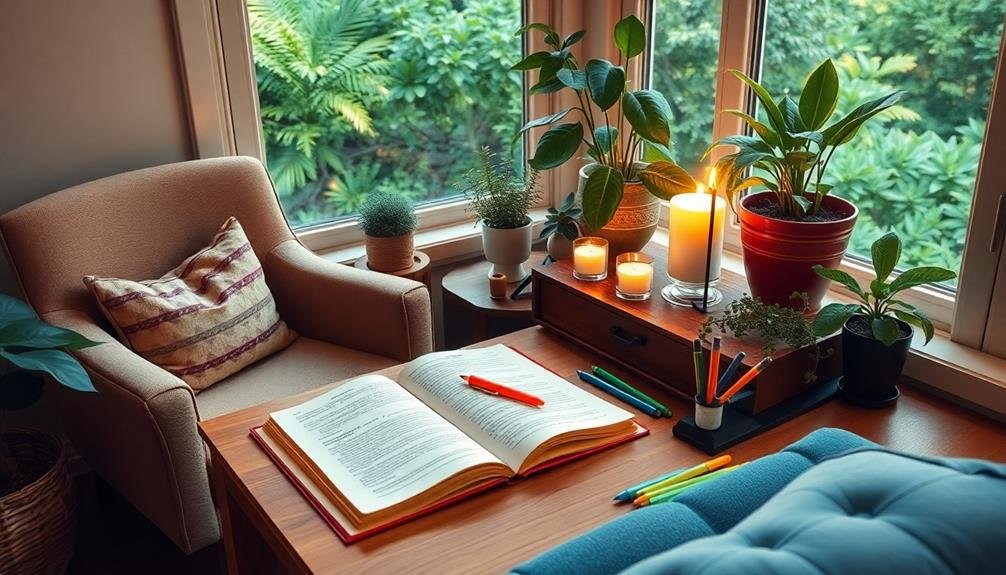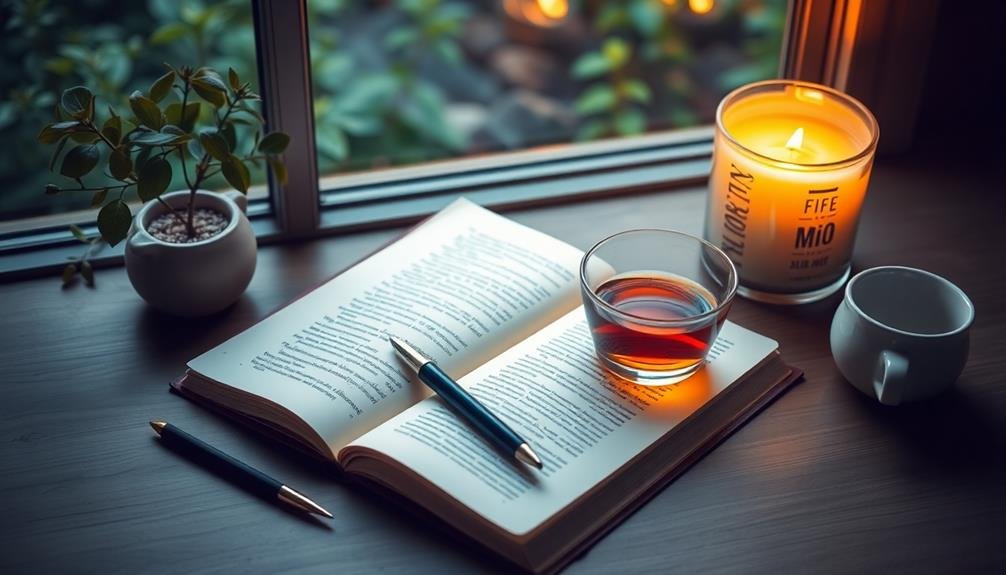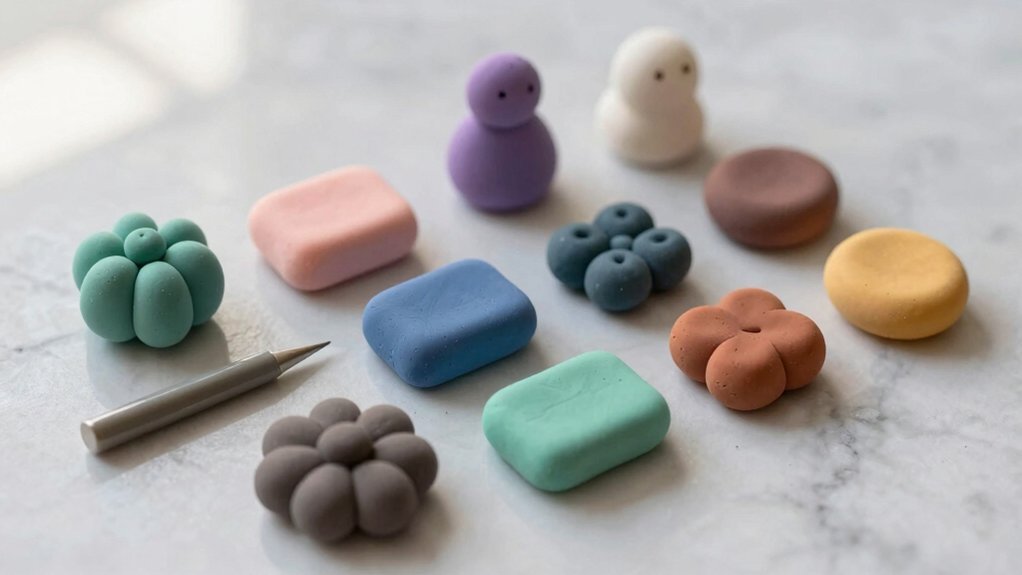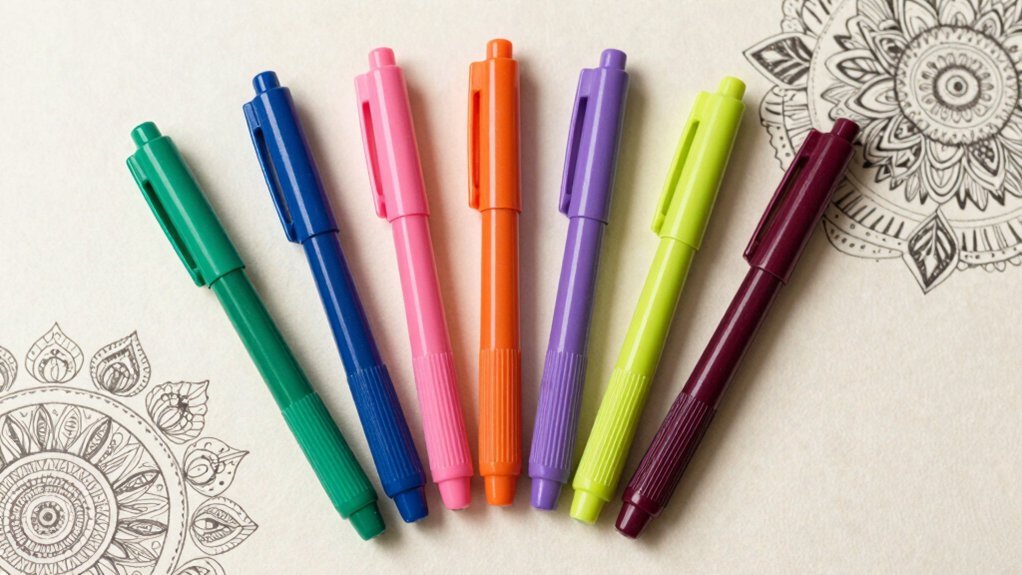Journaling is a powerful method to help you manage anxiety by allowing self-expression in a safe space. You can explore your overwhelming emotions and identify triggers through various techniques like stream of consciousness or gratitude journaling. Creating a comfortable journaling environment enhances focus, while mindfulness practices can ground your thoughts. Regular reflection helps track your progress and recognize patterns in your anxiety. Remember, it's normal to face writer's block; embracing imperfect writing can keep you going. If you want to discover more techniques and tips to fully utilize journaling, just keep exploring the possibilities!
Benefits of Journaling for Anxiety

Journaling can be your powerful ally in managing anxiety. When you put pen to paper, you create a safe space to express your thoughts and feelings without judgment. This act allows you to process emotions that often feel overwhelming, helping you gain clarity and perspective.
By writing down your worries, you can identify patterns and triggers, making it easier to address specific issues contributing to your anxiety. You'll find that articulating your feelings can lighten your mental load, allowing you to confront your thoughts head-on rather than letting them spiral out of control.
Moreover, journaling encourages mindfulness. When you focus on your writing, you pull your attention away from anxiety-provoking thoughts and anchor yourself in the present moment. This practice can lead to a sense of calm and control over your emotions.
Types of Journaling Techniques
When it comes to journaling for anxiety, you've got several techniques to choose from.
Stream of consciousness writing lets your thoughts flow freely, while gratitude journaling helps you focus on the positive.
Bullet journaling offers a structured way to track your feelings and progress, making it easier to manage anxiety.
Stream of Consciousness
A blank page invites you to let your thoughts flow freely, unfiltered and raw. This is the essence of stream of consciousness journaling. You don't have to worry about grammar, punctuation, or even coherent sentences. Just write whatever comes to mind. This technique can be incredibly liberating, allowing you to explore your feelings and thoughts without any barriers.
Here's a simple way to get started:
| What to Focus On | Benefits |
|---|---|
| Unfiltered Thoughts | Helps release pent-up emotions |
| Random Associations | Sparks creativity and insight |
| Continuous Writing | Enhances mental clarity |
Gratitude Journaling
Gratitude journaling offers a powerful way to shift your focus from what's lacking in your life to the abundance that surrounds you. By regularly acknowledging what you're thankful for, you can create a more positive mindset and reduce feelings of anxiety.
Here's how you can make gratitude journaling effective:
- Daily Reflections: Set aside a few minutes each day to write down three things you're grateful for. This could be anything from a supportive friend to a beautiful sunset.
- Be Specific: Instead of general statements, delve into details. Instead of just saying "I'm grateful for my family," specify a moment that made you feel loved by them.
- Use Prompts: If you're stuck, prompts can help. For example, ask yourself, "What made me smile today?" or "What challenges have taught me valuable lessons?"
- Review Regularly: Look back at your entries weekly or monthly. This helps reinforce your positive thoughts and reminds you of the good in your life, even during tough times.
Bullet Journaling
Bullet journaling is a versatile technique that combines organization and self-reflection, making it a popular choice for those looking to manage anxiety. By using a structured format, you can break down overwhelming tasks into manageable pieces. This method encourages you to jot down your thoughts, track your moods, and plan your days, helping you gain clarity and control.
Start by setting up a simple layout in a notebook. Use bullet points to capture tasks, events, and notes, and create sections for daily logs or monthly overviews. Incorporating habit trackers can also provide insight into patterns that affect your anxiety. You might find it helpful to note when you feel anxious and identify triggers, allowing you to develop strategies to cope.
Personalizing your bullet journal with colors, doodles, or motivational quotes can enhance your experience and keep you engaged. The act of writing itself can be therapeutic, giving you a safe space to express emotions.
Setting Up Your Journaling Space

Creating a comfortable journaling space can greatly enhance your writing experience and help manage anxiety. The right environment allows you to focus and express your thoughts freely. Here's how to set up your ideal journaling space:
- Choose a Quiet Spot: Find a location where you won't be easily disturbed. This could be a cozy nook in your home or a peaceful corner in a park.
- Add Comfortable Seating: Invest in a chair or cushion that supports you. Comfort is key, especially if you plan to spend time writing.
- Personalize Your Space: Surround yourself with items that inspire you, whether it's artwork, plants, or photographs. These elements can uplift your mood and spark creativity.
- Minimize Distractions: Keep your space tidy and remove items that could divert your attention. A clean workspace can help you feel more grounded and focused.
Prompts to Spark Reflection
Your journaling journey can benefit greatly from reflective prompts that encourage deeper thinking and self-discovery. Using prompts helps you immerse yourself in your thoughts and feelings, uncovering insights that might be buried beneath the surface.
Start with questions like, "What am I feeling right now, and why?" or "What triggers my anxiety, and how can I cope with it?" These questions push you to explore your emotional landscape.
Another prompt could be, "What are three things I'm grateful for today?" This simple shift in focus can help counteract negative thoughts and ground you in the present moment.
You might also consider reflecting on a challenging situation: "What did I learn from it, and how can I apply that lesson moving forward?"
Don't hesitate to write about your aspirations. Ask yourself, "What does my ideal day look like?" This can illuminate what truly matters to you and inspire positive changes.
Overcoming Writer's Block

When you sit down to write and find yourself staring at a blank page, it's essential to identify what's holding you back.
Setting a routine can help create a safe space for your thoughts, while embracing imperfect writing lets you focus on expression rather than perfection.
Let's explore these strategies to break through that writer's block together.
Identify Your Triggers
Understanding the root of your anxiety can be a powerful catalyst for overcoming writer's block. By identifying your triggers, you can better manage your feelings and enhance your creativity. Here are some common triggers to reflect on:
- Perfectionism: If you feel every word must be flawless, it can paralyze your writing process.
- Fear of Judgment: Worrying about how others will perceive your work can stifle your expression.
- External Pressure: Deadlines or expectations can create overwhelming stress, making it hard to focus.
- Self-Doubt: Questioning your abilities can lead to a mental block, making it tough to get started.
Take a moment to reflect on these triggers. Write down which ones resonate with you.
Recognizing these patterns can help you devise strategies to combat them. Journaling about your feelings can provide clarity and reveal underlying issues you mightn't have reflected on.
Set a Routine
Establishing a consistent writing routine can markedly reduce anxiety and alleviate writer's block. When you set aside specific times for journaling, you create a safe space for your thoughts and feelings. This predictability helps your mind shift into a writing mode, reducing resistance and encouraging creativity.
Here's a simple table to guide you in setting that routine:
| Time of Day | Activity |
|---|---|
| Morning | Write about your dreams or intentions for the day. |
| Midday | Reflect on your progress and any challenges faced. |
| Afternoon | Jot down thoughts or experiences that arise. |
| Evening | Review your day and express gratitude. |
| Night | Free writing to clear your mind before sleep. |
Embrace Imperfect Writing
Embracing imperfect writing is essential for overcoming writer's block and reducing anxiety. When you let go of the need for perfection, you'll find that your thoughts flow more freely onto the page.
Remember, your journal is a personal space, not a polished manuscript. Here are some tips to help you embrace this mindset:
- Start Small: Begin with just a few sentences. You don't have to write a novel; even a short entry can be powerful.
- Free Write: Set a timer for 5-10 minutes and write whatever comes to mind. Don't worry about grammar or structure—just let your thoughts spill out.
- Use Prompts: If you're stuck, prompts can spark inspiration. Try questions like, "What made me smile today?" or "What's weighing on my mind?"
- Revisit and Reflect: After writing, take a moment to read what you've penned. Celebrate the progress, even if it's imperfect.
Incorporating Mindfulness Practices
Incorporating mindfulness practices into your journaling routine can greatly enhance your ability to manage anxiety. Start by setting aside a few minutes before you write to focus on your breath. Close your eyes, inhale deeply, and exhale slowly. This simple act centers your thoughts and prepares your mind for the journaling process.
As you begin writing, keep your attention anchored in the present moment. Notice how your fingers feel on the page and the sound of your pen gliding across it. If your mind wanders to anxious thoughts, gently redirect it back to your breath or the words you're writing. This practice helps you cultivate awareness and develop a more grounded perspective.
You can also experiment with prompts that encourage mindfulness. For instance, write about what you see, hear, and feel in your surroundings. This not only distracts you from anxiety but fosters appreciation for the little things in life.
Lastly, consider using gratitude lists. Reflecting on positive aspects of your day can shift your focus from anxiety to contentment, making your journaling practice a powerful tool for emotional well-being.
Tracking Progress and Patterns

Tracking your progress and recognizing patterns in your anxiety can be incredibly empowering. By actively engaging with your feelings through journaling, you create a clearer picture of what triggers your anxiety and how you respond to it. This awareness helps you take actionable steps toward managing your feelings.
Here are four key areas to focus on while tracking your anxiety:
- Triggers: Identify specific situations, thoughts, or events that lead to increased anxiety. Are there common themes?
- Emotional Responses: Note how you feel during these moments. Are there particular emotions that surface more frequently?
- Coping Strategies: Record what strategies you used to cope. Did they help? What worked best?
- Progress Over Time: Reflect on your entries regularly. Are you noticing any improvements or changes?
Sharing Your Journey With Others
As you gain insight into your anxiety through journaling, consider sharing your experiences with others. Opening up about your journey can create connections and foster understanding. It's natural to feel hesitant, but sharing can also lighten your emotional load.
When you articulate your feelings, you might find that others relate to your struggles, offering support that can be incredibly comforting. You don't have to share every detail; even discussing general themes can help. Whether it's with friends, family, or a support group, your story can resonate with someone else, and they may appreciate your vulnerability.
This exchange can also inspire others to share their experiences, creating a safe space for open dialogue. Additionally, sharing your journey can enhance your own understanding. When you explain your thoughts and feelings to someone else, it can clarify your emotions and reinforce the insights you've gained through journaling.
It's a powerful way to validate your progress and remind yourself that you're not alone in this journey. So, don't hesitate to reach out—your voice matters, and your experiences could be a lifeline for someone else grappling with similar challenges.
Frequently Asked Questions
How Often Should I Journal for Anxiety Management?
You should journal daily, even if it's just for a few minutes. Consistency helps you process thoughts and feelings better. If daily feels overwhelming, aim for at least a few times each week.
Can Journaling Replace Professional Therapy for Anxiety?
Journaling can't fully replace professional therapy for anxiety. While it helps you process emotions and thoughts, therapists provide expert guidance and support. Combining both methods can enhance your mental well-being and coping strategies effectively.
What Supplies Do I Need to Start Journaling?
You don't need much to start journaling. Grab a notebook, some pens, or pencils—whatever feels comfortable. Choose a quiet space that inspires you, and let your thoughts flow freely. That's all you really need!
Is Digital Journaling as Effective as Handwritten Journaling?
Digital journaling can be just as effective as handwritten journaling, depending on your preferences. It offers convenience and accessibility, while handwritten notes may enhance memory and emotional connection. Try both to see what works best for you.
How Can I Stay Motivated to Journal Regularly?
To stay motivated to journal regularly, set specific times, keep it simple, and focus on your feelings. Reward yourself for consistency, and remember that it's your personal space to express thoughts and emotions freely.
In Summary
Incorporating journaling into your routine can be a powerful tool in managing anxiety. By exploring different techniques and prompts, you'll discover what resonates with you most. Remember to create a comfortable space for reflection and don't hesitate to share your journey with others. As you track your progress, you'll gain valuable insights into your thoughts and feelings. Embrace this personal journey; it's a meaningful step toward understanding and healing. Happy journaling!





Leave a Reply